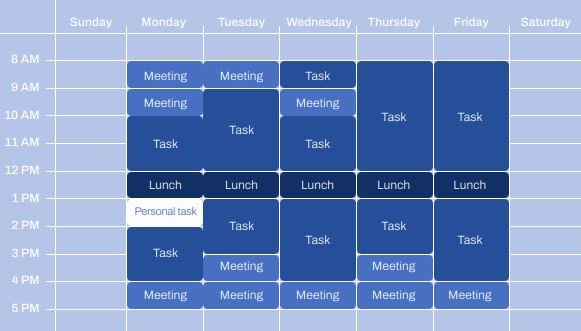In our fast-paced world, effective time management is crucial for maximizing productivity and achieving goals. One standout technique that’s gaining attention is time boxing. This method involves allocating specific time slots, or “boxes,” for tasks and activities. By setting fixed time limits, you can focus better, increase efficiency, and move closer to your objectives. Let’s delve into what makes time boxing so effective, its benefits, and strategies to tackle its challenges.
What Is Time Boxing?
Time boxing is a simple yet powerful time management technique that encourages working within predefined time frames. By breaking tasks into manageable chunks, it enhances focus and helps curb procrastination. Whether you’re managing projects, studying, or pursuing personal hobbies, time boxing can be applied across various aspects of life.
Join The 3x Productivity Insider
With my newsletter, you’ll get simple and practical tips to help you get more done and maximize your workday.
Every week, you’ll receive one actionable tip to save time, focus on what matters, and stay ahead in your career.


Benefits of Time Boxing
Increased Productivity
- Assigning tasks with specific time limits creates urgency, pushing you to work more efficiently. This sense of urgency reduces the likelihood of distractions and encourages a “now or never” mindset.
- It reduces the temptation to engage in perfectionism or unproductive activities. By focusing on completion rather than perfection, you make consistent progress without being bogged down by unnecessary details.
- With clear time constraints, your focus sharpens, resulting in higher output and a greater sense of accomplishment. You’ll find it easier to stay “in the zone,” leading to better-quality work in less time.
Better Task Prioritization
- By dedicating time slots to tasks, you’re forced to assess their importance and urgency. This structured approach ensures that high-priority tasks are addressed first, preventing last-minute rushes or missed deadlines.
- This method enhances organization and aids in making better decisions about how to allocate time. You’ll gain clarity on which tasks align with your goals, helping you to avoid wasting time on low-value activities.
- It also makes it easier to manage competing demands. When everything feels urgent, time boxing helps you take control and allocate your energy where it matters most.
Time Boxing in Action: Role Models
Prominent figures like Bill Gates, Cal Newport, and Elon Musk are known proponents of time boxing. Elon Musk, for instance, meticulously plans his days in 5-minute increments, showcasing how versatile this method can be. While not everyone needs such precision, it demonstrates time boxing’s adaptability to different work styles. Bill Gates uses a broader approach, dedicating time to reading and strategic thinking, which highlights the flexibility of the method for long-term planning. Meanwhile, Cal Newport’s application of time boxing focuses on deep work—a practice that emphasizes sustained, distraction-free effort.
Overcoming Time Boxing Challenges
While effective, time boxing isn’t without its challenges. Here’s how to tackle the most common ones:
The Planning Fallacy
This cognitive bias causes us to underestimate the time needed for tasks, often leading to missed deadlines or rushed work. It stems from an over-optimistic belief in our abilities to execute tasks quickly and without hurdles. To counteract it effectively:
- Use a time tracker to compare planned vs. actual time taken. Tracking your performance over time will provide invaluable insights into your tendencies and allow you to make more accurate future estimates.
- Break larger tasks into smaller, well-defined subtasks that are easier to estimate. For example, instead of “write a report,” break it into subtasks like “research topic,” “create outline,” and “draft sections.”
- Reflect on past experiences to identify patterns. If certain tasks consistently take longer than expected, factor this knowledge into your planning.
Interruptions and Unexpected Changes
Interruptions are inevitable, but flexibility is key to maintaining productivity and ensuring progress despite disruptions. Try these strategies:
- Prioritize and Reschedule: Determine the urgency of interruptions and adjust your schedule as needed. For example, a critical client request may require immediate attention, while a casual query can wait until your dedicated break.
- Buffer Time: Build buffer periods into your plan to account for unexpected disruptions. Aim for 10-15% of your total scheduled time as a buffer to keep your plans on track even when surprises arise.
- Communicate: Share your time boxing plan with colleagues or family to minimize unnecessary interruptions. Clear communication about your focus times can significantly reduce distractions.
- Learn from Patterns: Identify recurring interruptions and refine your strategy to mitigate them. If meetings often disrupt your focus, consider setting specific blocks for uninterrupted work and rescheduling less urgent discussions.
Conclusion
Time boxing is an impactful technique for managing time, boosting productivity, and overcoming challenges like the planning fallacy. By dedicating specific time slots to tasks, you can enhance focus, prioritize effectively, and achieve your goals more efficiently. Figures like Bill Gates and Elon Musk exemplify its potential, tailoring the method to their unique needs. While challenges like interruptions and inaccurate time estimates may arise, adopting the right strategies can help you harness the full benefits of time boxing.
Embrace time boxing as a tool to master your time and unlock your productivity potential.
Yes i journal on average 5 times a week and vary it,likewise as to number of days,and also my mood i log food exercise , i also do a gratitude journal ,this is quite important to me as it keeps me grounded and in the moment ,irony is the things you are most grateful for ,you just take for granted ,we must have a similar taste in books have read quite a few similar to recommendations above ,relating to efficiency,self development , focus ,habit/habit forming ,enjoyed the article thank you
Mark
Hi Mark,
great to hear that you are journaling and even have such a detailed routine with mood, gratitude, exercise, etc. I can fully agree, it keeps me grounded since I also believe that most often, we take the most important (but sometimes simplest things) just for granted…
It’s also nice to hear that you have a similar book taste but I hope you can still refresh your mind and learn some new insights when reading the lessons learned in the newsletter 🙂
Best, Lea
Comments are closed.